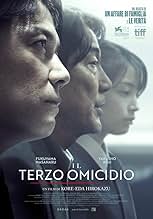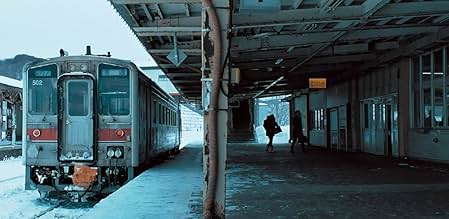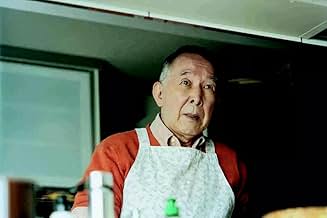AVALIAÇÃO DA IMDb
6,7/10
8,6 mil
SUA AVALIAÇÃO
Um drama judicial se concentra no assassinato do presidente de uma fábrica.Um drama judicial se concentra no assassinato do presidente de uma fábrica.Um drama judicial se concentra no assassinato do presidente de uma fábrica.
- Prêmios
- 6 vitórias e 17 indicações no total
Avaliações em destaque
The murderer in this film has killed twice. So, why is the film called 'The Third Murder?' It's up to the viewer to answer the question. In my view, the third victim is the truth. As one of the protagonists remarks in a crucial scene: 'No one has spoken the truth'.
'The Third Murder' is a film asking a lot of questions, but answering few. To be clear: that's a good thing. What is truth? What is righteousness? Which of the two are more important for a lawyer? And for a judge? Is capital punishment always wrong? Or, in the words of the killer: should some people never have been born?
With this film, acclaimed film maker Hirukazo Kore-eda takes a different path from many of his previous films. He is known for his delicate and subtle dramas about the family life of ordinary people. This time, he has made a sort of courtroom drama (although only a small part is actually set in a courtroom) about a killer and his possible motives.
Still, the theme of family relations is not absent in this film. Far from it, in fact. Fatherhood is omnipresent. One of the most important characteristics of the killer is how he has failed as a father. The lawyer defending him discusses the case with his own father, a retired judge who has convicted the same killer decades earlier. And the dead victim turns out to have been the worst father imaginable. At least, in one version of the truth.
'The Third Murder' is a multi-layered, complex film which offers lots of surprises and twists. Kore-eda succeeds in keeping the viewer wondering what comes next. But at the same time, the result is less convincing than in some of Kore-eda's best family dramas, in which human nature is dissected by small acts and symbolic details. Not by important, philosophical questions.
'The Third Murder' is a film asking a lot of questions, but answering few. To be clear: that's a good thing. What is truth? What is righteousness? Which of the two are more important for a lawyer? And for a judge? Is capital punishment always wrong? Or, in the words of the killer: should some people never have been born?
With this film, acclaimed film maker Hirukazo Kore-eda takes a different path from many of his previous films. He is known for his delicate and subtle dramas about the family life of ordinary people. This time, he has made a sort of courtroom drama (although only a small part is actually set in a courtroom) about a killer and his possible motives.
Still, the theme of family relations is not absent in this film. Far from it, in fact. Fatherhood is omnipresent. One of the most important characteristics of the killer is how he has failed as a father. The lawyer defending him discusses the case with his own father, a retired judge who has convicted the same killer decades earlier. And the dead victim turns out to have been the worst father imaginable. At least, in one version of the truth.
'The Third Murder' is a multi-layered, complex film which offers lots of surprises and twists. Kore-eda succeeds in keeping the viewer wondering what comes next. But at the same time, the result is less convincing than in some of Kore-eda's best family dramas, in which human nature is dissected by small acts and symbolic details. Not by important, philosophical questions.
The Third Murder is a gloomy courtroom drama that deals with complex topics like control, fatherhood and righteousness. The story revolves around young lawyer Shigemori who is asked to defend mysterious Misumi. His father once defended the strange man when he committed murder in the past and he managed to change his impending death penalty into a life imprisonment sentence. Soon after his release from prison, Misumi admits to have killed his former boss in order to steal his wallet and settle some gambling debts. However, Misumi soon starts offering different versions of what actually happened. Shigemori is unable to figure his client out but determined to win the case. He starts investigating the complex case himself and stumbles upon the victim's quiet wife and their handicapped daughter who seem to have something to hide. While trying to win the case, Shigemori doesn't only learn more about the lives of everyone involved but about his own family life.
The Third Murder is a movie that is quite tough to watch. Its pace is particularly slow. The investigation process is contradictory, difficult and inconclusive. The film doesn't offer any shifts in action or tension. The conclusion won't please those who are expecting a dynamic crime flick.
However, this film has an almost hypnotically gloomy atmosphere that gives it its very own style from start to finish. The characters are quite intriguing because they are difficult to figure out. Protagonist Shigemori almost pales in comparison to his fascinating client Misumi who meanders between being a manipulative madman, a calm sage in harmony with himself and a mentally broken elder. The dialogues are particularly well-written. The acting performances are quite credible and almost make the movie seem to be a documentary. The locations suit the sinister atmosphere very well as they manage to look beautiful despite their bleak darkness. The calm and precise cinematography completes the picture of this soulful drama.
In the end, you will appreciate The Third Murder if you are ready to watch a slow-paced courtroom drama with an inconclusive plot but intriguing characters and gripping atmosphere. This movie most certainly isn't for everyone but it's good at what it's attempting to be. Patient viewers will be rewarded with some intellectual food for thought.
The Third Murder is a movie that is quite tough to watch. Its pace is particularly slow. The investigation process is contradictory, difficult and inconclusive. The film doesn't offer any shifts in action or tension. The conclusion won't please those who are expecting a dynamic crime flick.
However, this film has an almost hypnotically gloomy atmosphere that gives it its very own style from start to finish. The characters are quite intriguing because they are difficult to figure out. Protagonist Shigemori almost pales in comparison to his fascinating client Misumi who meanders between being a manipulative madman, a calm sage in harmony with himself and a mentally broken elder. The dialogues are particularly well-written. The acting performances are quite credible and almost make the movie seem to be a documentary. The locations suit the sinister atmosphere very well as they manage to look beautiful despite their bleak darkness. The calm and precise cinematography completes the picture of this soulful drama.
In the end, you will appreciate The Third Murder if you are ready to watch a slow-paced courtroom drama with an inconclusive plot but intriguing characters and gripping atmosphere. This movie most certainly isn't for everyone but it's good at what it's attempting to be. Patient viewers will be rewarded with some intellectual food for thought.
In recent years, Hirokazu Koreeda has been among the most exciting and interesting Japanese filmmakers. In movies such as "Like Father, Like Son", "Our Little Sister" and "Shoplifters", he tells marvelous stories about seemingly ordinary and non-cimematic sitations....stories about real people and about problems which you rarely hear about in Japanese movies. Here, in a bit of a change of pace, Koreeda takes on a story about murder....and it's complex, strange and ultimately worth seeing. Sadly, however, the pacing is glacially slow...and many viewers ultimately might give up on the film before its conclusion.
The story is about a group of lawyers who have been a pretty hopeless case to defend. It seems a man has pled guilty to murder and burning a corpse...and he's done little to help himself avoid the death penalty. In addition, his story is very inconsistent and keeps changing. Inexplicably, instead of just going through the motions as most lawyers would do in a case like this, Shigemori keeps digging to learn exactly what did happen and why...and, not surprisingly, it's not what the case originally seemed to be.
The story is slow....very, very slow. For non-Japanese audiences, this slowness makes watching the film with subtitles a bit tough...and I found myself drifting off on occasion. My advice is to stick with it....the twist is shocking and exposes some issues rarely addressed in films...especially Japanese films. Not surprising, as Koreeda seems to enjoy addressing topics which other Japanese filmmakers avoid.
The story is about a group of lawyers who have been a pretty hopeless case to defend. It seems a man has pled guilty to murder and burning a corpse...and he's done little to help himself avoid the death penalty. In addition, his story is very inconsistent and keeps changing. Inexplicably, instead of just going through the motions as most lawyers would do in a case like this, Shigemori keeps digging to learn exactly what did happen and why...and, not surprisingly, it's not what the case originally seemed to be.
The story is slow....very, very slow. For non-Japanese audiences, this slowness makes watching the film with subtitles a bit tough...and I found myself drifting off on occasion. My advice is to stick with it....the twist is shocking and exposes some issues rarely addressed in films...especially Japanese films. Not surprising, as Koreeda seems to enjoy addressing topics which other Japanese filmmakers avoid.
The great lawyer Shigomori accepts a delicate case, the defense of Misumi, accused of theft and murder. Misumi, who thirty years earlier had served a prison sentence for murder, is now facing the death penalty. Astonishingly, the accused does not seem to care at all about his lot, the best evidence being that he does nothing to help his defender avoid it.
A specialist in childhood and family relations, Kore-eda ventures here into unfamiliar territory, the judicial thriller. The film raises interesting questions about the relativity of justice while at the same time keeping up the mystery: why does the accused, whose guilt is far from being proven, play cat and mouse with his defender and put obstacles in his way when he does everything in his power to save him from being hanged? Unfortunately, too much chatter and slowness diminishes the effectiveness of the film. But there are undeniable good points : the subtle acting of the two main protagonists, the beautiful nostalgic music by Ludovico Einaudi as well as the end of the film, a little more tonic than what preceded it. Quite a fair work on the whole but not up to the level of " Nobody Knows " or " Like father Like Son ".
A specialist in childhood and family relations, Kore-eda ventures here into unfamiliar territory, the judicial thriller. The film raises interesting questions about the relativity of justice while at the same time keeping up the mystery: why does the accused, whose guilt is far from being proven, play cat and mouse with his defender and put obstacles in his way when he does everything in his power to save him from being hanged? Unfortunately, too much chatter and slowness diminishes the effectiveness of the film. But there are undeniable good points : the subtle acting of the two main protagonists, the beautiful nostalgic music by Ludovico Einaudi as well as the end of the film, a little more tonic than what preceded it. Quite a fair work on the whole but not up to the level of " Nobody Knows " or " Like father Like Son ".
The defense attorney Shigemori (Masaharu Fukuyama) is summoned to help his coworkers in a murder case. The prisoner Misumi (Kôji Yakusho) has confessed the murder of his former boss and factory owner that was burnt to ashes nearby a river to rob his wallet to pay debts in gambling. Misumi will face death penalty since thirty years ago he killed another man and was defended by Shigemori´s father. Shigemori´s purpose is to change the sentence from death penalty to life. Shigemori is not satisfied with the lack of evidences of the case and notes that Misumi changes his testimony in each interview. He decides to investigate deeper the case and questions the true motive for the murder.
"Sandome no satsujin", a.k.a. "The Third Murder", is a tribunal and fatherhood drama with a screenplay with many twists. The storyline is based on a murder case with a confessing defendant and his new attorney seeking evidences to learn the truth. In common, there is the fatherhood: Shigemori is an absent father due to his dedication to his profession. Misumi is also an absent father since he has spent his last thirty years imprisoned. The victim was an abusive father and Misumi connects to his daughter as a second chance in life. In the end, was the murder to pay a debt with the Yakuza or a righteous justice act? My vote is seven.
Title (Brazil): "O Terceiro Assassinato" ("The Third Murder")
"Sandome no satsujin", a.k.a. "The Third Murder", is a tribunal and fatherhood drama with a screenplay with many twists. The storyline is based on a murder case with a confessing defendant and his new attorney seeking evidences to learn the truth. In common, there is the fatherhood: Shigemori is an absent father due to his dedication to his profession. Misumi is also an absent father since he has spent his last thirty years imprisoned. The victim was an abusive father and Misumi connects to his daughter as a second chance in life. In the end, was the murder to pay a debt with the Yakuza or a righteous justice act? My vote is seven.
Title (Brazil): "O Terceiro Assassinato" ("The Third Murder")
Você sabia?
- CuriosidadesThis is the first fiction film from Hirokazu Koreeda that was shot in anamorphic digital and framed in 2.35:1.
Principais escolhas
Faça login para avaliar e ver a lista de recomendações personalizadas
- How long is The Third Murder?Fornecido pela Alexa
Detalhes
- Data de lançamento
- País de origem
- Centrais de atendimento oficiais
- Idioma
- Também conhecido como
- The Third Murder
- Locações de filme
- Rumoi Station, Rumoi, Hokkaido, Japão(the three lawyers arrive in Rumoi)
- Empresas de produção
- Consulte mais créditos da empresa na IMDbPro
Bilheteria
- Faturamento bruto nos EUA e Canadá
- US$ 89.315
- Fim de semana de estreia nos EUA e Canadá
- US$ 10.670
- 22 de jul. de 2018
- Faturamento bruto mundial
- US$ 13.411.936
- Tempo de duração2 horas 4 minutos
- Cor
- Mixagem de som
- Proporção
- 2.35 : 1
Contribua para esta página
Sugerir uma alteração ou adicionar conteúdo ausente

Principal brecha
By what name was O Terceiro Assassinato (2017) officially released in India in English?
Responda

























